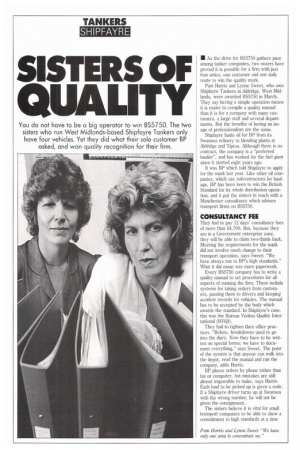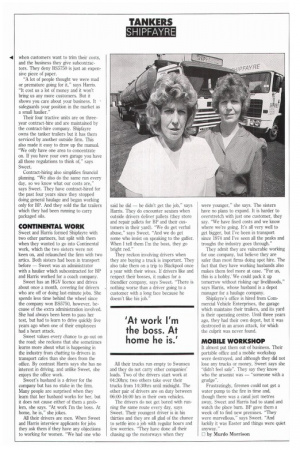SISTERS OF
Page 34

Page 36

If you've noticed an error in this article please click here to report it so we can fix it.
QUALI
You do not have to be a big operator to win BS5750. The two sisters who run West Midlands-based Shipfayre Tankers only have four vehicles. Yet they did what their sole customer BP asked, and won quality recognition for their firm.
• As the drive for BS5750 gathers pace among tanker companies, two sisters have proved it is possible for a firm with just four artics, one customer and one daily route to win the quality mark.
Pam Harris and Lynne Sweet, who own Shipfayre Tankers in Aldridge, West Midlands, were awarded BS5750 in March. They say having a simple operation means it is easier to compile a quality manual than it is for a company with many customers, a large staff and several departments. But the benefits of having an image of professionalism are the same.
Shipfayre hauls oil for BP from its Swansea refinery to blending plants at Aldridge and Tipton. Although there is no contract, the company is a "preferred haulier", and has worked for the fuel giant since it started eight years ago.
It was BP which told Shipfayre to apply for the mark last year. Like other oil companies, which use subcontractors for haulage, BP has been keen to win the British Standard for its whole distribution operation, and it put the sisters in touch with a Manchester consultancy which advises transport firms on BS5750.
CONSULTANCY FEE
They had to pay 12 days' consultancy fees of more than £4,700. But, because they are in a Government enterprise zone, they will be able to claim two-thirds back. Meeting the requirements for the mark did not involve much change to their transport operation, says Sweet: "We have always run to BP's high standards." What it did mean was more paperwork.
Every BS5750 company has to write a quality manual to set procedures for all aspects of running the firm. These include systems for taking orders from customers, passing them to drivers and keeping accident records for vehicles. The manual has to be accepted by the body which awards the standard. In Shipfayre's case, this was the Bureau Veritas Quality International (BVQI).
They had to tighten their office practices. "Before, breakdowns used to go into the diary. Now they have to be written on special forms; we have to document everything," says Sweet. The point of the system is that anyone can walk into the depot, read the manual and run the company, adds Harris.
BP places orders by phone rather than fax or computer, but mistakes are still almost impossible to make, says Harris. Each load to be picked up is given a code. If a Shipfayre driver turns up at Swansea with the wrong number, he will not be given the consignment.
The sisters believe it is vital for small transport companies to be able to show a commitment to high standards at a time when customers want to trim their costs, and the business they give subcontractors. They deny BS5750 is just an expensive piece of paper.
"A lot of people thought we were mad or premature going for it," says Harris. "It cost us a lot of money and it won't bring us any more customers. But it shows you care about your business. It safeguards your position in the market as a small haulier."
Their four tractive units are on threeyear contract-hire and are maintained by the contract-hire company. Shipfayre owns the tanker trailers but it has them serviced by another outside firm. This also made it easy to draw up the manual. "We only have one area to concentrate on. If you have your own garage you have all those regulations to think of," says Sweet.
Contract-hiring also simplifies financial planning. "We also do the same run every day, so we know what our costs are," says Sweet. They have contract-hired for the past four years since they stopped doing general haulage and began working only for BP. And they sold the flat trailers which they had been running to carry packaged oils.
CONTINENTAL WORK
Sweet and Harris formed Shipfayre with two other partners, but split with them when they wanted to go into Continental work, which the two sisters were not keen on, and relaunched the firm with two artics. Both sisters had been in transport before — Sweet was an administrator with a haulier which subcontracted for BP and Harris worked for a coach company.
Sweet has an HGV licence and drives about once a month, covering for drivers who are off or doing last-minute jobs. She spends less time behind the wheel since the company won BS5750, however, because of the extra administration involved. She had always been keen to pass her test, but had to learn to drive quickly five years ago when one of their employees had a heart attack.
Sweet values every chance to go out on the road; she reckons that she sometimes learns more about what is happening in the industry from chatting to drivers in transport cafes than she does from the office. By contrast Harris says she has no interest in driving, and unlike Sweet, she enjoys the office work.
Sweet's husband is a driver for the company but has no stake in the firm. Many people are surprised when they Learn that her husband works for her, but it does not cause either of them a problem, she says. "At work I'm the boss. At home, he is," she jokes.
All their drivers are men. When Sweet and Harris interview applicants for jobs they ask them if they have any objections to working for women. "We had one who said he did — he didn't get the job," says Harris. They do encounter sexism when outside drivers deliver pallets (they store and repair pallets for BP and their customers in their yard). "We do get verbal abuse," says Sweet, "And we do get some who insist on speaking to the gaffer. When I tell them I'm the boss, they go bright red."
They reckon involving drivers when they are buying a truck is important. They also take them on a trip to Blackpool once a year with their wives. If drivers like and respect their bosses, it makes for a friendlier company, says Sweet. "There is nothing worse than a driver going to a customer with a long face because he doesn't like his job."
All their trucks run empty to Swansea and they do not carry other companies' loads. Two of the drivers start work at 04:30hrs; two others take over their trucks from 14:30hrs until midnight. The other pair of drivers are on duty between 06:00-16:00 hrs in their own vehicles.
The drivers do not get bored with running the same route every day, says Sweet. Their youngest driver is in his thirties and they are all glad of the chance to settle into a job with regular hours and few worries. "They have done all their chasing up the motorways when they were younger," she says. The sisters have no plans to expand. It is harder to overstretch with just one customer, they say. "We have fixed costs and we know where we're going. It's all very well to get bigger, but I've been in transport since 1974 and I've seen all the peaks and troughs the industry goes through."
They admit they are vulnerable working for one company, but believe they are safer than most firms doing spot hire. The fact that they have working husbands also makes them feel more at ease. "For us, this is a hobby. We could pack it up tomorrow without risking our livelihoods," says Harris, whose husband is a depot manager for a haulage company.
Shipfayre's office is hired from Commercial Vehicle Enterprises, the garage which maintains their trailers, and its yard is their operating centre. Until three years ago, they had their own depot, but it was destroyed in an arson attack, for which the culprit was never found.
MOBILE WORKSHOP
It almost put them out of business. Their portable office and a mobile workshop were destroyed, and although they did not lose any trucks or money, Sweet says she "didn't feel safe". They say they know who the arsonist was — "someone with a grudge".
Frustratingly, firemen could not get a water pump to the fire in time and, though there was a canal just metres away, Sweet and Harris had to stand and watch the place burn. BP gave them a week off to find new premises. "They were marvellous," says Sweet. "And luckily it was Easter and things were quiet anyway," 11 by Murdo Morrison








































































































































